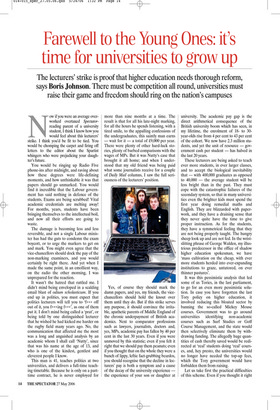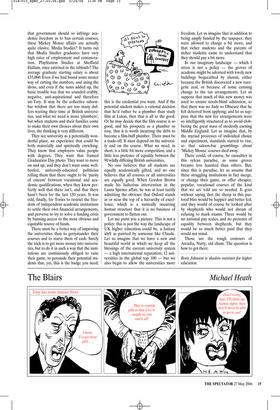Farewell to the Young Ones: it’s time for universities to grow up
The lecturers’ strike is proof that higher education needs thorough reform, says Boris Johnson. There must be competition all round, universities must raise their game and freedom should ring on the nation’s campuses Now if you were an average overworked overtaxed Spectatorreading parent of a university student, I think I know how you would feel about this lecturers’ strike. I think you’d be fit to be tied. You would be chomping the carpet and firing off letters to the editor about the Spartist whingers who were prejudicing your daughter’s future.
You would be ringing up Radio Five phone-ins after midnight, and raving about how these degrees were life-defining moments, and how unthinkable it was that papers should go unmarked. You would find it incredible that the Labour government has said nothing in defence of the students. Exams are being scrubbed! Vital academic credentials are melting away! For months, years, students have been bringing themselves to the intellectual boil, and now all their efforts are going to waste.
The damage is becoming less and less reversible, and not a single Labour minister has had the guts to condemn the exam boycott, or to urge the markers to get on and mark. You might even agree that the vice-chancellors should dock the pay of the non-marking examiners, and you would certainly be right there. And yet when I made the same point, in an emollient way, on the radio the other morning, I was unprepared for the reaction.
It wasn’t the hatred that rattled me. I didn’t mind being enveloped in a scalding email blast of odium scholasticum. If you end up in politics, you must expect that politics lecturers will tell you to ‘f*** off out of it, you f***ing f***’, as one of them put it. I don’t mind being called a ‘prat’, or being told by one distinguished lecturer that he wished he had kicked me harder on the rugby field many years ago. No, the communication that affected me the most was a long and anguished analysis by an academic whom I shall call ‘Nutty’, since that was his name at the age of 13, and who is one of the kindest, gentlest and cleverest people I know.
This man is 41, teaches politics at two universities, and delivers a full-time teaching timetable. Because he is only on a parttime contract, he is never employed for more than nine months at a time. The result is that for all his late-night marking, for all the hours he spends listening, with a tired smile, to the appalling confessions of the undergraduates, this saintly man earns — wait for it — a total of £9,000 per year. There were plenty of other hard-luck stories, plenty of barbed comparisons with the wages of MPs. But it was Nutty’s case that brought it all home; and when I understood that my old friend was being paid what some journalists receive for a couple of Daily Mail columns, I saw the full seriousness of the lecturers’ position.
Yes, of course they should mark the damn papers, and yes, my friends, the vicechancellors should hold the knout over them until they do. But if this strike serves any purpose, it should convince the irritable, apathetic parents of Middle England of the chronic underpayment of British academics. Next to comparator professions such as lawyers, journalists, doctors and, yes, MPs, academic pay has fallen by 40 per cent in the last 30 years. Even if you were unmoved by this statistic; even if you felt it right that we should pay them peanuts; even if you thought that on the whole they were a bunch of lippy, leftie fact-grubbing beardos, you should recognise that the decline in lecturers’ pay is both a symptom and a cause of the decay of the university experience the experience of your son or daughter at university. The academic pay gap is the direct arithmetical consequence of the British university boom which has seen, in my lifetime, the enrolment of 18to 30year-olds rise from 4 per cent to 43 per cent of the cohort. We now have 2.3 million students, and yet the unit of resource — government cash per student — has halved in the last 20 years.
These lecturers are being asked to teach ever more students, in ever larger classes, and to accept the biological inevitability that — with 400,000 graduates as opposed to 40,000 — the average student will be less bright than in the past. They must cope with the catastrophic failures of the secondary system, so that in many universities even the brighter kids must spend the first year doing remedial maths and English. They are blizzarded with paperwork, and they have a draining sense that they never quite have the time to give proper instruction. As for the students, they have a symmetrical feeling that they are not being properly taught. The hungry sheep look up and are not fed. In the wristslitting phrase of George Walden, my illustrious predecessor in the office of shadow higher education spokesman, we have ‘mass cultivation on the cheap, with ever more students herded into ever-expanding institutions to graze, untutored, on ever thinner pastures’.
It was this pessimistic analysis that led some of us Tories, in the last parliament, to go for an even more pessimistic solution. In case you have forgotten the last Tory policy on higher education, it involved reducing this bloated sector by banning the so-called Mickey Mouse courses. Government was to go around universities identifying non-academic courses such as Surf Studies or Golf Course Management, and the state would then selectively eliminate them by withdrawing funding. The allegedly huge quantities of cash thereby saved would be redirected at ‘real’ students doing ‘real’ courses, and, hey presto, the universities would no longer have needed the top-up fees, which the Tory government would have forbidden them from raising.
Let us take first the practical difficulties of this scheme. Even if you thought it right that government should so infringe academic freedom as to ban certain courses, these Mickey Mouse affairs are actually quite elusive. Media Studies? It turns out that Media Studies graduates have very high rates of employment and remuneration. PlayStation Studies at Sheffield Hallam, once satirised in the tabloids? The average graduate starting salary is about £35,000. Even if we had found some neater way of cutting the numbers, and axing the dross, and even if the sums added up, the basic trouble was that we sounded crabby, negative, anti-aspirational and therefore un-Tory. It may be the collective saloonbar wisdom that there are too many duffers wasting their time at British universities, and what we need is more ‘plumbers’, but when students and their families come to make their own choices about their own lives, the thinking is very different.
They see university as a potentially wonderful place, an experience that could be both materially and spiritually enriching. They know that employers value people with degrees. They want that framed Graduation Day photo. They want to move on and up, and they don’t want some wellheeled, university-educated politician telling them that there ought to be ‘parity of esteem’ between vocational and academic qualifications, when they know perfectly well that there isn’t, and that there hasn’t been for the last 130 years. It was odd, finally, for Tories to restrict the freedom of independent academic institutions to settle their own financial arrangements, and perverse to try to solve a funding crisis by banning access to the most obvious and equitable source of funds.
There must be a better way of improving the universities than to gerrymander their courses and to starve them of cash. Surely the trick is to get more money into universities, but to do it in such a way that the institutions are continuously obliged to raise their game, to persuade their potential students that, yes, this is the badge you need; this is the credential you want. And if the potential student makes a rational decision that he’d rather be a plumber than study film at Luton, then that is all to the good. Or he may decide that the film course is so good, and his prospects as a plumber so rosy, that it is worth incurring the debt to become a film-buff plumber. There must be a trade-off. It must depend on the university and on the course. What we need, in short, is a little bit more competition, and a little less pretence of equality between the 90 wildly differing British universities.
No one believes that all students are equally academically gifted, and no one believes that all courses or all universities are equally good. When Gordon Brown made his ludicrous intervention in the Laura Spence affair, he was at least tacitly admitting the obvious: that Oxford stands at or near the top of a hierarchy of excellence, which is a naturally occurring human structure that it is no business of government to flatten out.
Let me paint you a picture. This is not a policy; this is just the way the landscape of UK higher education could be, a fantasy idyll as painted by someone like Claude. Let us imagine that we have a new and beautiful world in which we keep all the blessings of the current university system — a high international reputation; 12 universities in the global top 100 — but we also begin to allow the universities more freedom. Let us imagine that in addition to being amply funded by the taxpayer, they were allowed to charge a bit more, and that richer students and the parents of richer students came to understand that they should pay a bit more.
In our imaginary landscape — which I stress is not a policy — the groves of academe might be adorned with lovely new buildings bequeathed by alumni, either because the British discovered a new euergetic zeal, or because of some cunning change to the tax arrangements. Let us suppose that much of this new money was used to ensure needs-blind admission, so that there was no Jude so Obscure that he felt deterred from applying; and let us suppose that the new fee arrangements were so intelligently structured as to avoid clobbering the great mass of modestly earning Middle England. Let us imagine that, by the myriad processes of individual choice and experiment, standards started to rise, so that saloon-bar grumblings about ‘Mickey Mouse’ courses died away.
There could, of course, be casualties in this sylvan paradise, as some groves became less haunted than others. But, since this is paradise, let us assume that these struggling institutions in fact merge, or change their game, or offer cheaper, popular, vocational courses of the kind that we are told are so needed. It goes without saying that the sheep in this pastoral bliss would be happier and better fed, and they would of course be looked after by shepherds who would not dream of refusing to mark exams. There would be no national pay scales, and no pretence of equality between shepherds, but they would be so much better paid that they would not mind.
Those are the rough contours of Arcadia, Nutty, old chum. The question is how to get there.
Boris Johnson is shadow minister for higher education.











































































































 Previous page
Previous page